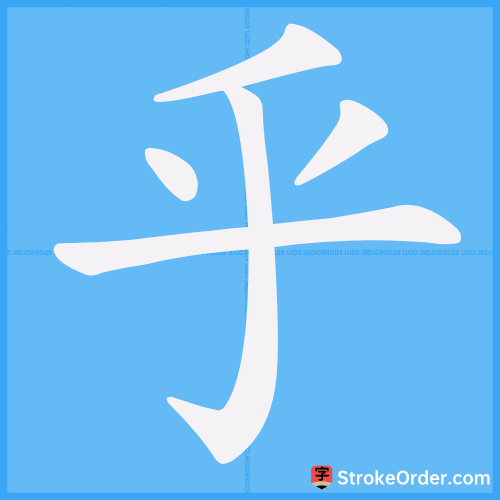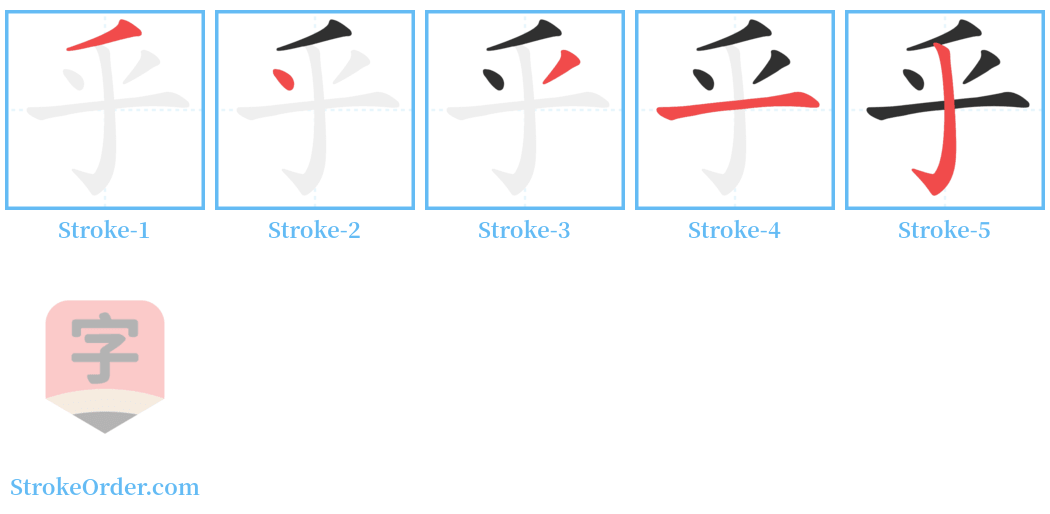乎 Stroke Order
Animated Stroke Order of 乎

Stroke Order Diagrams for 乎

Step-by-Step Handwriting Guide for 乎

Learn to Write Chinese Characters with Video Tutorials
Watch the video of writing the Chinese character "乎", learn the correct stroke order (笔顺) of the character "乎", and master the standard way of writing the character "乎".
Free Printable Handwriting Practice with Stroke Order: 乎
Printable Writing Practice Worksheet of "乎" in Portrait Orientation (Tian Zi Ge)

Printable Writing Practice Worksheet of "乎" in Landscape Orientation (Tian Zi Ge)

Information of 乎
Pinyin
hū
Radical
丿
Strokes
5 strokes
Usage
★★★★★
Definition
(interrog. part.)
乎
[hū]
Meaning:
1. A literary particle indicating a question.
(Example: 汝识之乎? [Do you know it?])
2. A literary exclamatory particle.
(Example: 陛下与谁取天下乎![Your Majesty, with whom will you take the world?])
3. A literary preposition equivalent to "于", used after verbs or adjectives.
(Examples: 在乎 [at]; 无须乎 [need not]; 异乎寻常 [different from the ordinary].)
4. Ancient suffix for adjectives or adverbs.
(Examples: 巍巍乎 [majestic]; 郁郁乎 [lush].)
5. An ancient character similar to "呼", meaning to exclaim.
6. Literary usage indicating inquiry or a rhetorical question.
7. Equivalent to "吗".
8. Indicates an exclamatory tone or call.
9. Indicates a request or command, equivalent to "啊" or "呀".
10. Indicates conjecture.
11. Indicates a call to someone, equivalent to "啊" or "呀".
12. Indicates a tone of discussion.
13. Indicates an affirmative tone.
14. Used in a sentence to indicate a slight pause, easing the tone and attracting attention to the following words.
Prepositional Uses:
1. 於;在 ([En.] in; at) - introducing the time of an action or event.
(Example: 吾独穷困乎此时也! [I alone am in distress at this time!])
2. 於;从 ([En.] from) - indicating the time of occurrence.
(Example: “春秋”何以始乎隐? [When does the spring and autumn begin?])
3. 於;在 ([En.] in) - indicating the place where an action occurs.
(Example: 楚人生乎楚。[People from Chu live in Chu.])
4. 於;从 ([En.] from) - indicating the location of an action.
(Example: 叫嚣乎东西。[The shouting is coming from east and west.])
5. 於;因为; 由于; 在于 ([En.] because) - indicating the reason for an action.
(Example: 不动乎众人之非誉。[Do not be moved by the misrepresentation of others.])
6. 於;按照; 根据 ([En.] according to) - indicating rules followed by actions.
(Example: 素富贵,行乎富贵。[To adhere and act according to wealth.]
7. 於,对。 ([En.] to) - indicating the object of an action.
(Example: 吾尝疑乎是。[I have often doubted this.])
Suffix Uses:
1. Used after a single-syllable or a reduplicated adjective.
(Example: 许多新事物,确乎到处可见; [Many new things are truly seen everywhere.])
2. Used after verbs or adverbs to form new verbs or adverbs.
(Example: 他对这点事却不在乎; [He isn’t concerned about this matter.])
3. Used after adjectives, cannot be translated independently.
(Examples: 宜乎众矣。[It should be so.])
Note: This translation is a summary of the original definitions in Chinese. Some interpretations may vary based on context.
lit. 之[zhi1], 乎[hu1], 者[zhe3] and 也[ye3] (four grammatical particles of Classical Chinese) (idiom); fig. archaic expressions
due to / to stem from / to go beyond (also fig. beyond reason, expectations etc) / to go against (expectations)
not in the least concerned (idiom) / reckless / couldn't give a damn about it / unperturbed / couldn't care less / harum scarum
Input Method for 乎
Pinyin
hu1
Wubi
tuhk|tufk
Cangjie
hfd
Zhengma
mua
Four Corner
20409
Unicode
U+4e4e
Same Pronunciation Characters